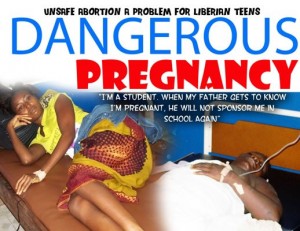Monrovia – Pale and weak, Pauline Kule was rushed to the James N. Davis Memorial hospital in July because she had been bleeding profusely. The 19-year-old swallowed 15 pills hoping to get rid of an unwanted pregnancy.
 A ninth-grade student, Kule says she was afraid her father would withdraw his financial support if he found out she was pregnant. She says she is not yet ready to be a mother. “I’m a student. When my father gets to know I’m pregnant, he will not sponsor me in school again,” she says.
A ninth-grade student, Kule says she was afraid her father would withdraw his financial support if he found out she was pregnant. She says she is not yet ready to be a mother. “I’m a student. When my father gets to know I’m pregnant, he will not sponsor me in school again,” she says.
Pauline is among some 60 cases of unsafe abortion treated each month at the Paynesville hospital. Abortion is illegal in Liberia, so women and girls undertake it alone and in secret, often risking their lives and their ability to have children.
Thirty to 40 percent of unsafe abortion cases received by the hospital are girls between the ages of 14 and 18, according to Dr. Celia Kohn, the hospital’s chief of obstetrics.
“Usually when the girls are brought in they are septic, sometimes they die,” says Dr. Kohn.
Some women and girls undertake unsafe abortions alone, while others seek out illegal practitioners. A popular method is known as the RPG, or rocket-propelled grenade.
“Some herbs that they have been preparing according to what they have been telling us, they mix it with some substances and broken pieces of glass bottles and they insert it into them,” says Dr. Kohn. Some girls who try to induce abortion die because of severe laceration of the cervix.
“It burns all the vagina … They open it’s all acid … three months ago a woman died from toxic shock,” says Dr. Kohn. This practice is common in Liberia, she says. Methods like the RPG are responsible for 90 percent of the abortions carried out in Africa, where only Cape Verde, South Africa and Tunisia allow unrestricted abortion.
An estimated 4.2 million African women resort to these dangerous practices each year, and 30,000 die as a result, according to the World Health Organization (WHO).
Although only 10 percent of the global total of abortions happen in Africa, the continent accounts for almost half of the world’s deaths from unsafe abortions, with one in 12 women dying, according to WHO.
For every death, 20 to 30 women suffer permanent damage to their uterus, cervix, fallopian tubes, intestines or bladder.
According to the United Nations Population Fund, about 530,000 women die in pregnancy or childbirth every year, nearly half of them — 247,000 — in sub-Saharan Africa. Getting girls to stay on contraceptives is a challenge, says Dr. Kohn.
“We do some family planning for them and advise them about safe sex but it is not easy, it is not easy,” she says.
“Always we do sexual education, we ask them ‘What do you want for your future? You’re here sick and your partner is out there. He’s healthy maybe he’ll look for another girl and you’re sick and risking your life,” says Dr. Kohn.
The best thing a teenager can do to prevent unwanted pregnancies is to take advantage of family planning, says Dr. Torsu Y. Jallabah, the hospital’s medical director.
“If you’re not prepared to get pregnant the best you can do is go to family planning until you can get ready, but it is very risky to get pregnant and then to decide to abort it.” Most of the teenagers conduct the unsafe abortions all by themselves, says Dr. Jallabah.
“Either through the insertion of some herbs, some instruments, some sticks, various items are used,” he says. Girls who use methods like the RPG risk losing the ability to get pregnant, says Dr. Jallabah.
“Those that insert and don’t come to hospital sooner until the entire uterus is rotted out, we perform hysterectomies. The hospital often sees repeat patients. “In less than a month’s time they come back here pregnant with the same complications,” Dr. Jallabah says.
Some unsafe abortion are also carried out by unqualified practitioners at substandard health facilities, according to Joseph Coleman, Clinical Field Coordinator of the Liberia Medical and Dental Association.
“Some of those people who carry out unsafe abortion, they don’t have the requisite qualification to do it,” he says.
He says unsafe abortion among teenagers is prevalent in Liberia, but most of the cases are not reported to the country’s health authorities because abortion itself is illegal in Liberia. Dr. Jallabah says more needs to be done to sensitize teenagers on the dangers of unsafe abortion.
